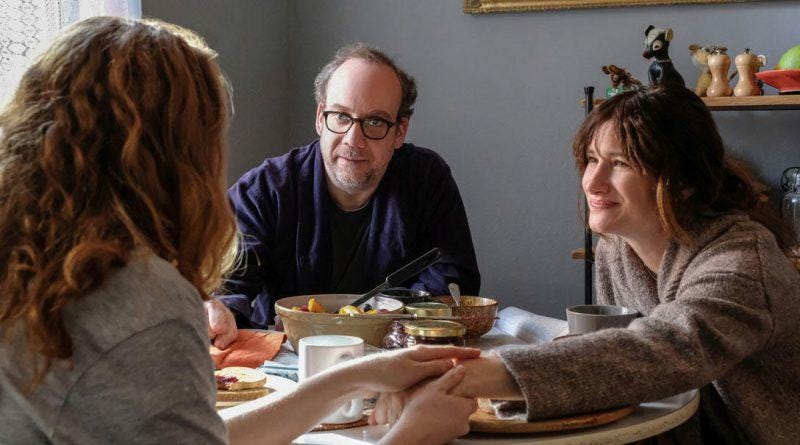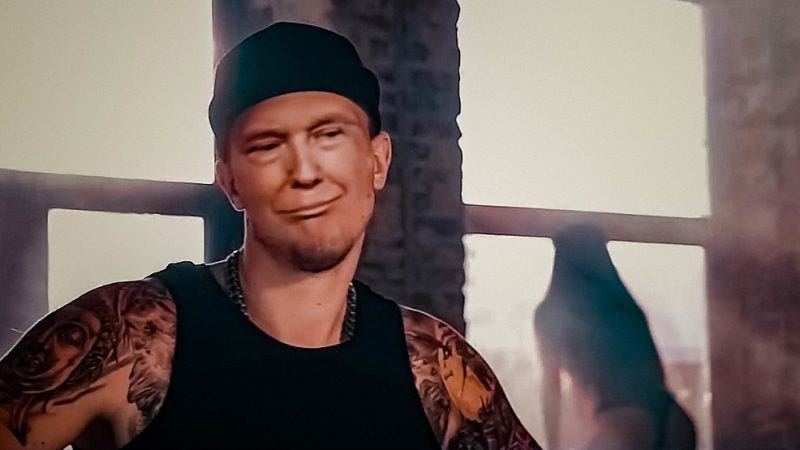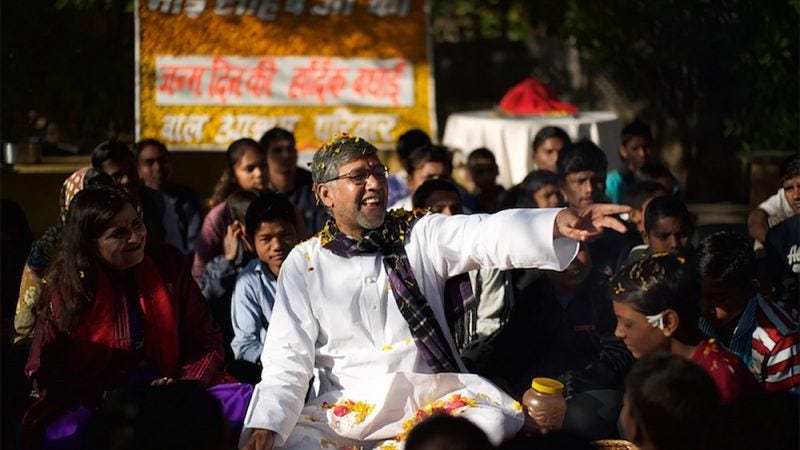2018 Sundance Film Festival Day 1 brings ‘Private Life’ and ‘Our New President’
Click to read the full story: 2018 Sundance Film Festival Day 1 brings ‘Private Life’ and ‘Our New President’
The 2018 Sundance Film Festival is already in full swing as the first weekend is always the most intense with those huge distribution deals being made in between mad dashes for the next ‘must see’ premiere.
The indie (although some still argue that point) fest kicked off on Thursday with Robert Redford giving a press conference, and there will be plenty of ‘informal chats’ each day beginning at 11 AM MT. This year’s chats will include will.i.am and Kevin Smith, Ethan Hawke and Rupert Everett, Ira Glass and Miranda July to name a few. You can check out the program guide to make sure you don’t miss anything.
Here’s a rundown of Day 1 screenings:

Private Life
Opening Night celebrations doubled as a homecoming for two filmmakers who’ve become regulars at the Festival. Tamara Jenkins first appeared at Sundance with her short film Family Remains in January 1994, then developed her first feature The Slums of Beverly Hills (1998) at the Institute’s Director’s Lab, before returning to the Festival with her second feature, The Savages, in 2007. Eleven years later, she’s back with Private Life, which stars Kathryn Hahn and Paul Giamatti. Meanwhile, Maxim Pozdorovkin is back with his third straight feature to premiere at the Festival. His latest, Our New President, is an entirely archival found footage documentary comprised of recent Russian propaganda and follows The Notorious Mr. Bout (2014) and Pussy Riot: A Punk Prayer (2013). Each film could be considered the most ambitious and daring yet for these directors, and these first audiences of the Festival seemed more than up for the adventure.
Asked why this project after an 11-year break between features, Tamara Jenkins talked of her reluctance to develop events from her personal life into a fictional narrative. In the film, Hahn and Giamatti play a married pair of 40-something writers who are trying to have a baby, attempting everything from artificial insemination to surrogacy. “My husband and I went through some version of this, not quite like this, but something like this,” she told the Eccles Theater audience during the post-screening Q&A. “When we were in the throes of our own infertility drama, a girlfriend of mine said ‘This is really great material.’ And I though that was insane, I thought it was repellant. That I would never write about this. But then time went by, and I started looking around I realized that a lot of people I knew in my circle were going through something similar. They were people who had unconventional careers and maybe waited longer than would be prescribed, and I started noticing that it was something beyond myself.” Asked about how she managed to transpose personal experience into a universal story, she said, “It’s not a memoir, but you take something true or something you know very well, and it becomes a launching pad for what if, what if, what if.”
When the discussion turned to the problems Hahn’s character faces in the film for trying to have a baby later in life, she and her co-star Kayli Carter, who plays the couple’s step-niece and spirited collaborator in their quest to become parents, talked frankly about those challenges and what they mean for professional women. “Women shouldn’t only have to think about their fertility first,” Carter said. “There shouldn’t be a stigma about taking care of yourself first, and then dealing with” whether or not you want to have a baby. “It’s also a real bummer that a woman’s main moneymaking years happen to coincide with their most fertile,” Hahn said. “It’s just a biological bummer. We’re led to believe that we’re somewhat in control of our fertility now, and we aren’t.”
Jenkins joked that she had considered a more pretentious and pointed title for the film, something along the lines of the florid Birdman or (The Unexpected Virtue of Ignorance). “It would be like, Private Life: The Biological Tyranny of the Female Condition,” she said.

Our New President
For Our New President, Pozdorovkin set out to make a film about fake news by comprising it entirely of fake news. “We wanted to make a film out of television news without a single true statement in it,” he said after the premiere at the Egyptian Theater. Most of the footage comes from state-controlled Russian TV, and what’s shown couldn’t be more timely, as it documents absurd-but-effective factually inaccurate coverage of the 2016 U.S. election and early presidency of Donald Trump, the man evidently supported by Russian media to be the new president of the film’s title. The film contains no voiceover or interviews, just intermittent text to contextualize different sources and useful backstories of principal players in the Russian media. He admitted that the approach of going full fakery asks more of the audience than mixing in reputable outlets, but also that there’s more to be gained from facing such propaganda head-on. The endgame, said Pozdorovkin, was “to make people critical about the techniques of propaganda. And that takes sitting through this material and feeling it out,” rather than editorializing. “It’s a story we all know, but showing it from such a radical perspective, through such a crooked mirror, the techniques of propaganda become much more prominent and much more felt than you would otherwise. When you read about Russian propaganda it’s really hard to get a feel for it, but there’s something special that happens when you’re forced to sit and take it.”
When asked about the parallels between the disinformation presented on Russian TV and sources such as Fox News and InfoWars, Pozdorovkin acknowledged crossover but also made important distinctions. “The difference is that someone like Alex Jones is ultimately still a somewhat marginalized figure whose audience base is fairly homogenous,” he said. “But [the Russian sources] are the most popular and most watched programs on television. So the kind of mainstream effect that this has is profound, structurally different from someone like Alex Jones.” Yet he was quick to point out that the tactics employed by Russian TV directly descend from the contemporary American ways of presenting the news. “Our news stations have been abusing journalistic standards and evidentiary standards for years—because of celebrity, because of sensationalism, and this is just that extreme case, where you take that to the logical endpoint, which is outright fabrication,” he said. “This is a story that’s more extreme than the American version solely because the production of the news is much more centrally controlled. But the problem of eroding journalistic standards is a problem that we all have that we have to grapple with.”
Along with clips from official Russian news sources, the film also shows homemade YouTube clips of regular citizens parroting the lies they’ve heard on TV. “A lot of times we’d find someone saying something ridiculous and then we’d have to track down where this piece of information came from. Because one of the things that makes Russia an interesting case study for fake news is that basically all the people there have no firsthand experience of America. So all their ideas about America come from television, and television news, especially American politics. So we wanted to build the whole film on that dialogue between this news and the way that people regurgitate it.” That research led them to discoveries that both paralleled and anticipated what’s been reported in U.S. mainstream media over the past year, for example winding their way to the existence of media trolls, whose job has been to spread fake news, most of which originated on Russian TV, through American social media, all in an effort to affect the outcome of the election. “When we first started digging through this material, the extent of the Russian involvement wasn’t very clear,” he said. “We were feeling this out in the spring, and it didn’t become common knowledge here until I think September.”
“Film usually takes a year or two to catch up with what’s happening,” said a Sundance film programmer and moderator. “When we got this submission we were like, ‘holy crap, this is fresh. This is happening right now.’”

Kailash
For his often-harrowing first feature documentary, Derek Doneen could hardly have found a subject more dramatic and worthwhile than Kailash Satyarthi. The story of the Nobel laureate who risks his life and the lives of his family and colleagues by breaking into factories to rescue children from slavery, is told in Doneen’s debut film, simply titled Kailash, which had its world premiere in the U.S. Documentary Competition on Thursday.
Opening on a daring intense police raid on a New Delhi factory to rescue imprisoned young boys, Doneen puts viewers immediately into a typically intense day in the life of Satyarthi. Touting his mantra that every child should be free to be a child, Kailash and wife Sumedha operate BBA (Bachpan Bachao Andolan, or Save the Children Movement), an organization which employs hundreds of activists, social workers, and lawyers to infiltrate these factories and rescue, rehabilitate and educate children who’ve been stolen from their families and forced to work as slaves to create consumer goods for the Western market.
Doneen told the audience that he and his crew could have taken their hidden cameras and shot with Kailash any three months and they’d have gotten different stories that were just as dramatic. “There were countless other children at the ashrams whose stories we don’t delve into quite as much, but who are equally inspiring,” he said. “There’s amazing work that Kailash is doing on a global level and building child-friendly villages in India were 98-percent of the children who were working are now going to school and getting an education.”
Satyarthi, who walked to the podium to an extended standing ovation, joked that he’d previously been unfamiliar with Sundance and had asked his wife to give him dancing lessons to prepare, but he now fully understands the power of documentary filmmaking. “I’m pretty sure that this film will help in advancing my lifelong fight against child slavery and child labor,” he stated. “I know that this film will awaken the conscience of millions of people around the world.”

Generation Wealth
With her third feature, Generation Wealth — an often disturbing cautionary tale about global materialism — photographer/filmmaker Lauren Greenfield not only explores the macro level of her previous work but also looks inward to explore herself as a storyteller and investigate how she personally connects to the subjects that fascinate her. Generation Wealth, which debuted Thursday night in the Documentary Premieres section at the 2018 Festival ahead of its theatrical release in July (courtesy of Amazon Studios), marks a return to the Festival for Greenfield, who received the U.S. Documentary Directing Award in 2012 for her reverse rags-to-riches story The Queen of Versailles.
Much of the new doc finds Greenfield reconnecting with the folks of her past work, notably those featured in her 1997 photo book Fast Forward, which offered a snapshot into the lives of Los Angeles youth of privilege. She also aims her camera at numerous other status-conscious subjects, including notorious German businessman Florian Homm and an adult film star formerly known as Kacey Jordan, who, following a bout of tabloid fame and fortune after a tussle with Charlie Sheen, went on an equally fast and depressing decline. With these interviews, Greenfield often exposes the inevitable darker side to wanton materialism.
During the Q&A that followed the premiere, Greenfield insisted that the dark underbelly of greed has always been present in her work. “One of the reasons I did this project is that over these 25 years everything has kind of blown up,” she stated. “The things I was looking at in the ’90s have gone on turbo drive in ways I couldn’t have expected, but … you can see how [they] began. In a way there’s a little bit of hope in this film that emerged unexpectedly.”
Over the course of the film, Greenfield begins to examine her own obsessions, which are noted by her two sons, Noah and Gabriel, as she ignores their requests to stop recording them, even in their most inconsequential moments. She addresses her own complicated relationship with her often distant mother, who is also interviewed on camera. Greenfield noted that her mother was so anxious about the interview that she developed heart palpitations and had to be admitted into the hospital — but the situation had a silver lining that ended up impacting the direction of the documentary. “I had this crew and no interview subject, so I asked Noah if he’d be interviewed again,” she shared. “He came out with this comment about the damage that was being done, and that really changed the film because that was something I didn’t expect at all. It started an inquiry, and I realized that in some ways I was repeating patterns from my mom.”
As she investigates both her subjects and herself, Greenfield deftly crafts a story that insightfully questions the motivations driving us all.
The post 2018 Sundance Film Festival Day 1 brings ‘Private Life’ and ‘Our New President’ appeared first on Movie TV Tech Geeks News By: George Cando
